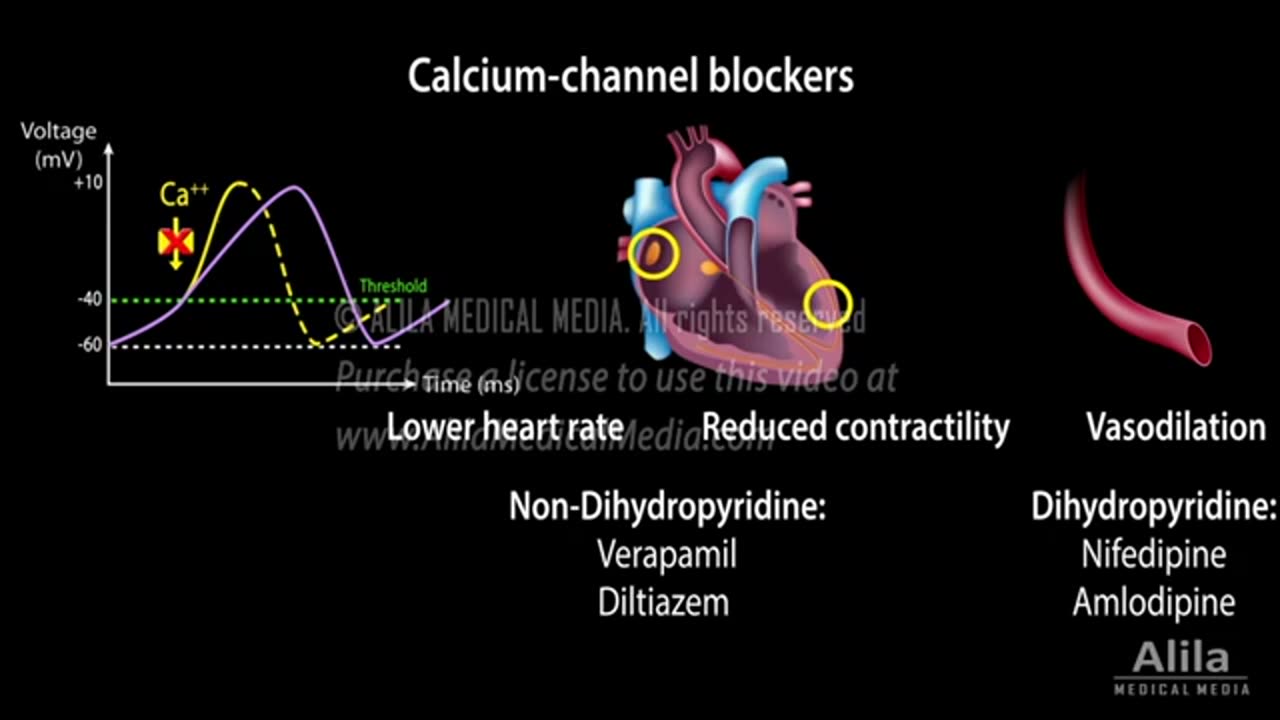Premium Only Content

ANTIANGINAL DRUGS
Rational for treatment and prevention of angina. Mechanisms of action of beta-blockers, calcium channel blockers, and organic nitrates.
All images/videos by Alila Medical Media are for information purposes ONLY and are NOT intended to replace professional medical advice, diagnosis or treatment.
Angina is a major symptom of ischemic heart disease. It manifests as chest pain and is caused by reduced blood flow to the heart. Angina occurs when the heart’s demand for oxygen is greater than the oxygen supply it can get.
Antianginal drugs aim to:
- dilate coronary blood vessels to increase flow to the heart;
- and/or reduce the heart’s workload to reduce oxygen demand, typically by reducing heart rate or contractility.
Three drug classes are used in the treatment or prevention of angina: beta-blockers, calcium channel blockers, and organic nitrates. In addition, antiplatelet drugs such as aspirin may also be prescribed to prevent blood clots.
- Beta-blockers bind to beta1-adrenergic receptors and block the sympathetic influences that act through these receptors. Sympathetic nerves release norepinephrine to increase SA node firing rate and cardiac conductibility at the AV node. Sympathetic activation increases cardiac output in situations that require energy, such as during physical activities. This is when the heart must work harder and angina may occur. Beta-blockers suppress sympathetic effects, decreasing heart rate and thereby reducing the heart’s workload. However, because beta-blockers also slow down conduction through the AV node, they may cause heart blocks.
- Calcium-channel blockers block calcium channels that are responsible for action potential generation in the SA node, as well as contraction of cardiac myocytes and vascular smooth muscle. Blocking these channels results in a lower heart rate, reduced contractility of the heart, and vasodilation. The dihydropyridine class acts on blood vessels. They are powerful vasodilators but their action can lead to reflex tachycardia and increased cardiac contractility. Non-dihydropyridine agents, on the other hand, primarily act to decrease heart rate, contractility; and are less effective on blood vessels. Because of their cardiac depressant effect, they should not be used for patients with systolic heart failure.
- Organic nitrates act by releasing nitric oxide, a powerful vasodilator. They dilate both arteries and veins, but primarily veins, and thus producing a major reduction in preload and a moderate reduction in afterload on the heart. They also inhibit coronary spasms.
Sublingual nitroglycerin is a short-acting nitrate. It diffuses immediately into the bloodstream, producing a fast but short-lived action, and is therefore used for immediate angina relief. Long-acting nitrates, beta-blockers, calcium channel blockers, and antiplatelet drugs are used for prevention of angina, with beta-blockers typically being first-line therapy.
-
 LIVE
LIVE
LFA TV
12 hours agoLIVE & BREAKING NEWS! | THURSDAY 10/16/25
4,054 watching -
 2:02:00
2:02:00
Game On!
18 hours ago $1.08 earnedTwo 40 Year Old QBs BATTLE It Out On Thursday Night Football!
11.7K2 -
 1:22:45
1:22:45
Tucker Carlson
12 hours agoTucker & Steve Bannon on Jay Jones’ Desire to Genocide Republican Kids and the Future of the Right
113K188 -
 12:21
12:21
Ken LaCorte: Elephants in Rooms
19 hours ago $1.88 earnedWill Trump Take Greenland?
14.7K15 -
 36:57
36:57
RiftTV
12 hours agoPREMIERE: DC Dive with Jordan Conradson | Guest: Ben Bergquam | Pilot Episode #1
29.8K5 -
 8:35
8:35
Faith Frontline
14 hours agoAndrew Huberman Just SHOCKED The World With His Belief in God
15.9K8 -
 1:59:43
1:59:43
BEK TV
1 day agoTrent Loos in the Morning - 10/16/2025
24K3 -
 1:58:09
1:58:09
Dialogue works
2 days ago $4.58 earnedLarry C Johnson & Paul Craig Roberts: Can peace be imposed on Israel? - Russia and China Step In
43.4K17 -
 8:10
8:10
Nate The Lawyer
2 days ago $4.82 earnedNY AG Letitia James Pattern | All 3 Mortgages Have False Statements
36.6K33 -
 17:35
17:35
Actual Justice Warrior
1 day agoDMV Workers CAUGHT Selling CDL Tests To Migrants
30K47